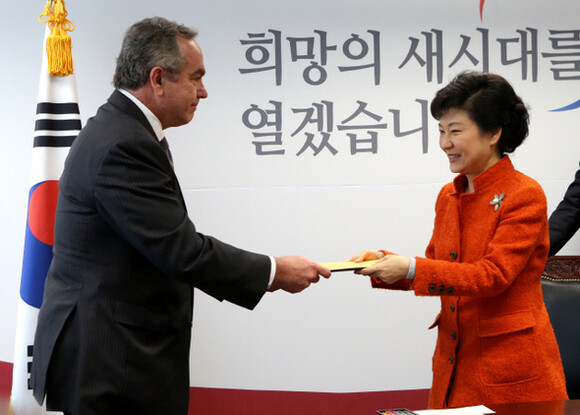hankyoreh
Links to other country sites 다른 나라 사이트 링크
Park Geun-hye talks NK nukes with US delegation

By Song Chae Kyung-hwa and Park Byong-su, staff reporters
On Jan. 16, Korean president-elect Park Geun-hye met with a US government delegation that included Kurt Campbell, assistant secretary of state for East Asian and Pacific affairs. “We cannot allow the North to develop nuclear weapons. We will respond with resolute action,” said Park during the meeting.
Park met the delegation at her office in the Tongui neighborhood in Seoul. “While we cannot allow the North to develop nuclear weapons and we will respond with resolute action, it is also necessary for us to bear in mind the quality of life in the North. This is why we must keep open the possibility of dialogue, including humanitarian aid,” Park said, according to her spokesperson Cho Yoon-sun.
“We will work together closely with the US in the process of building trust on the Korean peninsula.”
“I am looking forward to seeing continued development of the cooperative relationship between the US and South Korea on the occasion of the 60th anniversary of the alliance between the two countries,” Park said. “In order to help the US-Korea alliance develop into an comprehensive strategic alliance for the 21st century, I believe that we must forge a new cooperative relationship built on steadfast trust.”
“As I see it, the freedom and economic development that we enjoy today are not gifts, but rather the result of the US and Korea working together to face challenges and overcome difficulties,” Park said in a positive assessment of relations with the US.
Accompanying Campbell at the meeting were Daniel Russel, senior director for Asian affairs on the National Security Council, and Mark Lippert, assistant secretary of defense for Asia and the Pacific with the US Department of Defense.
Park also referred to revising the US-Korean nuclear energy agreement. South Korea is currently at odds with the US over how to dispose of spent nuclear fuel.
“One of Park’s campaign pledges was to secure a reliable supply of energy and method for dealing with nuclear waste,” Cho said. “Considering this, and the fact that these issues are so urgent [for South Koreans], Park told the US envoys that she hopes the US will provide us with helpful ideas about, and be willing to discuss, how to resolve this issue in a way that the international community can trust.”
The day before, on Jan. 13, Campbell’s delegation sat down with Minister of Defense Kim Kwan-jin, and on the morning of Jan. 14 they held a meeting with officials including Minister of Unification Ryu Woo-ik, Deputy Minister of Foreign Affairs and Trade Kim Kyu-hyun and Senior Secretary to the President for Foreign Affairs and National Security Chun Young-woo.
After the meeting was over, Campbell held a press conference. On the question of UN Security Council sanctions for North Korea’s long-range missile launch, he said, “We are currently discussing the matter with key countries such as China and Russia. We should be seeing some progress soon.”
Please direct questions or comments to [english@hani.co.kr]

Editorial・opinion
![[Column] Season 2 of special prosecutor probe may be coming to Korea soon [Column] Season 2 of special prosecutor probe may be coming to Korea soon](https://flexible.img.hani.co.kr/flexible/normal/500/300/imgdb/original/2024/0426/3317141030699447.jpg) [Column] Season 2 of special prosecutor probe may be coming to Korea soon
[Column] Season 2 of special prosecutor probe may be coming to Korea soon![[Column] Park Geun-hye déjà vu in Yoon Suk-yeol [Column] Park Geun-hye déjà vu in Yoon Suk-yeol](https://flexible.img.hani.co.kr/flexible/normal/500/300/imgdb/original/2024/0424/651713945113788.jpg) [Column] Park Geun-hye déjà vu in Yoon Suk-yeol
[Column] Park Geun-hye déjà vu in Yoon Suk-yeol- [Editorial] New weight of N. Korea’s nuclear threats makes dialogue all the more urgent
- [Guest essay] The real reason Korea’s new right wants to dub Rhee a founding father
- [Column] ‘Choson’: Is it time we start referring to N. Korea in its own terms?
- [Editorial] Japan’s rewriting of history with Korea has gone too far
- [Column] The president’s questionable capacity for dialogue
- [Column] Are chaebol firms just pizza pies for families to divvy up as they please?
- [Column] Has Korea, too, crossed the Rubicon on China?
- [Correspondent’s column] In Japan’s alliance with US, echoes of its past alliances with UK
Most viewed articles
- 1‘We must say no’: Seoul defense chief on Korean, USFK involvement in hypothetical Taiwan crisis
- 2[Column] Season 2 of special prosecutor probe may be coming to Korea soon
- 3N. Korean delegation’s trip to Iran shows how Pyongyang is leveraging ties with Moscow
- 4Korea sees more deaths than births for 52nd consecutive month in February
- 5Amnesty notes ‘erosion’ of freedom of expression in Korea in annual human rights report
- 6[Reportage] On US campuses, student risk arrest as they call for divestment from Israel
- 7[Editorial] New weight of N. Korea’s nuclear threats makes dialogue all the more urgent
- 8‘Weddingflation’ breaks the bank for Korean couples-to-be
- 9[Column] Has Korea, too, crossed the Rubicon on China?
- 10[Column] Park Geun-hye déjà vu in Yoon Suk-yeol